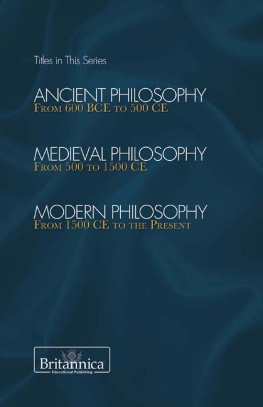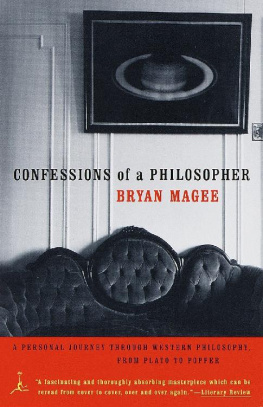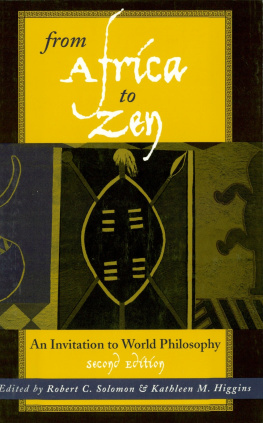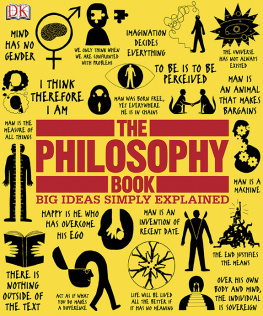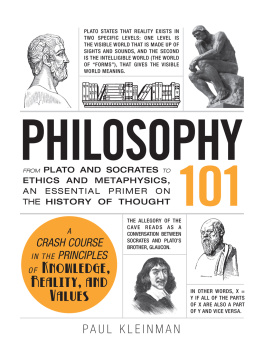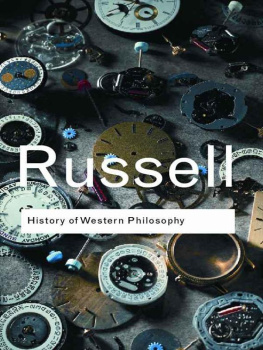Philosophy for Life
Mel Thompson
For my daughter, Rebecca
Contents
Acknowledgements
The author and publishers would like to thank the following for their permission to use copyright material in this book:
The Observer for the newspaper extract on page 37; Chatto and Windus for the quotation from Iris Murdochs Metaphysics as a Guide to Morals; Penguin Books Ltd for the quotation from Descartes Discourse on Method and Chambers Concise Dictionary (2nd edition, 2009), for its definition of philosophy.
Taking it further
Many books, both classic and modern, have been referred to within the text, and they may serve as a next step for those wanting to deepen their understanding of the subject.
However, books, articles and websites are constantly appearing and changing, and it is therefore unrealistic to attempt to list here all the material that may be of value to those wanting to follow up on issues raised in this book.
Those wanting to explore the subject further should therefore visit the Philosophy for Life website, which provides a range of suitable material and web-links. It also gives you an opportunity to leave comments, ask questions or recommend material for inclusion. Just log on to: www.philosophyforlife.co.uk. You can also visit the authors website at: www.philosophyandethics.com
Meet the author
Welcome to Philosophy for Life!
Were all philosophers. When theres a tough choice to be made, when faced with the facts of birth, love or death, or simply when thinking about what we want to do with our lives or what we hold dear, we all tend to ask fundamental questions and to use our reason to try to make sense of our situation. Work is no escape from it; whether its examining the logic of a business decision, sifting the relevance of scientific data, or trying to express oneself as clearly as possible in an email, we are exercising our philosophical muscles. To me, philosophy is doing what comes naturally, but doing it in a rigorous and systematic way, and not opting out when the mental going gets tough. Its a wonderful discipline for clearing the mind; a skill like no other. Its also a point of entry into the history of ideas, perusing the wisdom of the past to aid our decisions for the future.
Thats why, for me, philosophy is for life. It goes beyond taking an interest in academic arguments and the history of ideas, presenting us with an essential tool for rational living, sharpening up our ability to think, to listen to the arguments of others, to weigh evidence and to examine reasons. We live in a time (sometimes labelled post-truth) when emotional appeals and unquestioned assumptions too often dominate the media. Philosophy does not deny the power of emotion or intuition, but it sets it in context. To live life to the full requires balance, empathy, reason and the development of a purposeful sense of what life is for. Philosophy therefore contributes not just a body of wisdom, but an essential set of skills for living well.
Mel Thompson, 2017
Introduction: Thinking to Enhance your Life
In this Introduction you will:
Be aware that philosophy is a skill as well as a body of knowledge
Consider how precise thinking puts you in control
Explore different styles of argument
Reflect on the therapeutic value of philosophy
According to the Concise Chambers Dictionary, philosophy is:
The search for truth and knowledge concerning the universe, human existence, perception and behaviour, pursued by means of reflection, reasoning and argument
Any particular system or set of beliefs established as a result of this
A set of principles that serves as a basis for making judgements and decisions
To philosophize involves thinking clearly and accurately, considering evidence, reflecting on experience, sorting out arguments and testing out claims. Philosophy also probes the meaning of life; it examines morality, politics and religion; it challenges our assumptions and invites us to think again about our opinions.
Some overall sense of who we are and what life is for may enhance our appreciation of life in general. Where do we stand on the big issues that face us? How can we find contentment in a world that includes so much suffering and evil? How do we come to terms with our own fragility and mortality? What does it mean to be an individual, and how does that affect the way we treat others? What, if anything, can we know for certain? These universal and personal questions are not exclusively philosophical, nor are they necessarily issues with which professional philosophers wrestle on a day-to-day basis, but I want to suggest that most of the topics covered in courses in philosophy can be related to them, so that some knowledge of philosophy can yield immediate, personal benefits, quite apart from the intellectual stimulus that studying philosophy offers.
In order to enjoy and benefit from philosophy, it is important to remember that it is both an activity and a body of knowledge:
As an activity, it is a matter of asking questions, challenging assumptions, re-examining traditionally held views, unpacking the meaning of words, weighing up the value of evidence and examining the logic of arguments. It cultivates an enquiring and critical mind, even if it sometimes infuriates those who want an easy intellectual life. Philosophy clarifies your thinking, your way of expressing yourself, your way of examining arguments, and sharpens up your ability to make reasoned decisions. Philosophy is a tool with which to expose nonsense, and express ideas in a way that is as unambiguous as possible.
As a body of knowledge, philosophy is the cumulative wisdom of some of the worlds greatest thinkers. It offers you a chance to explore fundamental questions and to see what philosophers in different periods of history have had to say about them. You can examine the philosophy of a particular period. The philosophy of ancient Greece, for example, is particularly important for understanding the origins of much Western thought and culture. You might look at the philosophy of the European Enlightenment, or of the twentieth century, each giving an insight into ideas that developed out of and shaped that particular period of history. This historical perspective on ideas is valuable, because it frees you from being limited by the unquestioned assumptions of those around you. To be able to think through issues from first principles is helped by having looked at the way in which philosophers have gone about their work in the past, so this second aspect of philosophy reinforces the first.
So we can see philosophy as a life-tool, a set of skills for engaging with any subject, but also as a body of wisdom that can serve as a guide and help inform our decisions and moral judgments.
Take back control!
In a lecture in 1854, Louis Pasteur is reported to have said In the fields of observation, chance favours only the prepared mind. It is my view that, in life as in observation, the varied situations and crises that chance throws up present both hazards and opportunities. The person who is alert and sensitive to what life is about, and who has already considered the fundamental principles of what we can know or what we should do, will hopefully be better able to grasp and use each situation to the full. It has always been appreciated that information is needed in order to make good business decisions. At one time, an advertisement for the


